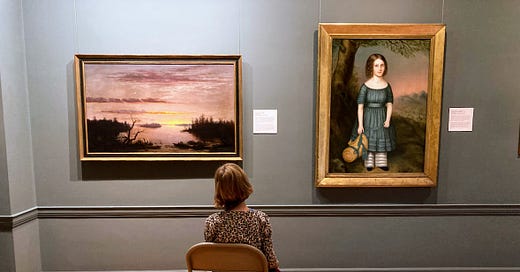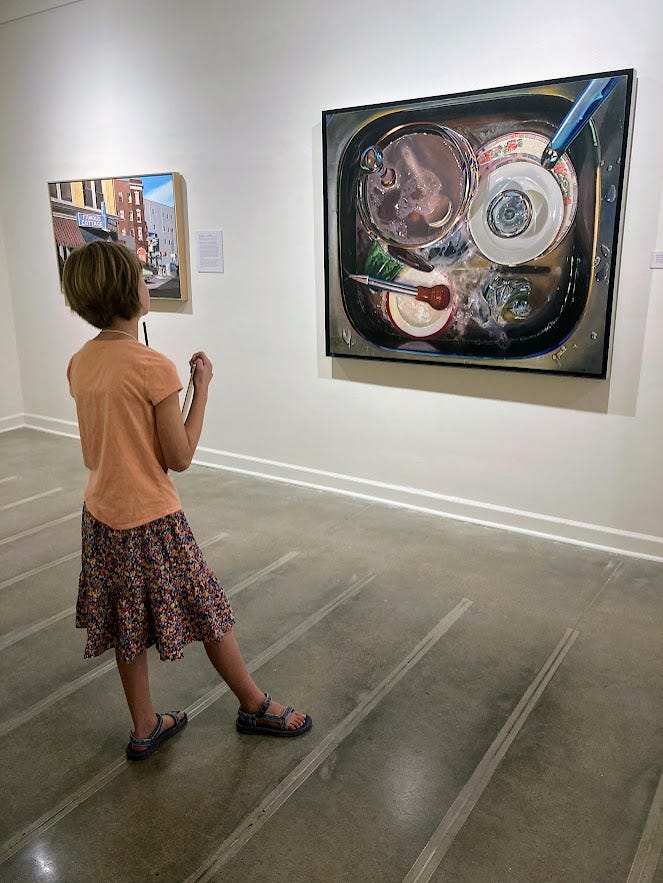Six Essays I'm too Fizzy to Write
Fizzy: (adj) a neurodivergent state of buzzy excitement in which goodness overwhelms and words fail
They’re almost too much, the goodnesses.
There is a young character in Elizabeth Goudge’s novel A City of Bells1 who spends a season with a theater troupe in London. On return to her nature-enveloped cathedral town, she describes the sensation that the city had turned her upside down and shaken all the thoughts out of her head.
Like nine-year-old Henrietta, I am too full to think, and it’ll take a minute in the quiet to come back to myself from a week steeped in youth art camp and teaching prep2 and novel writing and a host of other things. I’d like to write an essay on each3, but where to start?4 Instead, my fizzy brain offers you this list:
Stephen Nedoroscik, but especially the part at the end with the unstoppable hugging, in the middle of which a teammate brings him his glasses. That little act of handing a fellow human the lenses by which they need to see. That knowledge of another, the understanding of what they need. The way you can see in the video that it is effortlessly done, given and received, suggesting this has happened before; this is the way of this team around this person.5
The hour I was privileged to spend this week guiding elementary and middle schoolers through poetry exercises at our local art museum’s summer camp. The fact that a crew of children want to spend a week surrounded by fine art. The way they can pivot from visual art to talking about words without worrying if they’re going to say the right or wrong thing. The manner in which their faces light up when they realize there are action verbs to be found even in the seemingly stillest of landscape paintings (blowing, glowing, waiting, hovering). The way they brought me their ekphrastic6 diamante7 poems with shining eyes, ready to hear that the ideas inside of them had spilled onto the page in a way that is good, good, good.8 The way their poems sang. The way a clutch of young humans are going to grow into adult humans with the ability to look deeply and see because of this one week they spent drenched in art. The way it feels to be part of something that is both small and huge at the same time.
James Baldwin. (Happy 100th!)
“One must say Yes to life and embrace it whenever it is found — and it is found in terrible places; nevertheless, there it is. For nothing is fixed, forever and forever and forever, it is not fixed; the earth is always shifting, the light is always changing, the sea does not cease to grind down rock. Generations do not cease to be born, and we are responsible to them because we are the only witnesses they have. The sea rises, the light fails, lovers cling to each other, and children cling to us. The moment we cease to hold each other, the moment we break faith with one another, the sea engulfs us and the light goes out.
~James Baldwin, The Price of the Ticket
The way my engineer-degree, project manager, history-loving husband picked up a translation of The Mabinogion, that medieval compendium of the earliest Welsh legends, several of which inform the Wales-Wheelchairs-Wise Women-Magical Books novel I’m slowly at work on. And read it thoughtfully for a long stretch on the sofa last night, closed the book, and said, “That was pretty interesting,” then recounted to me the entire tale of Pwyll Prince of Dyfed and the wronged queen Rhiannon, and even though I’m low-level obsessed with Welsh mythology and studied and translated it decades ago in grad school, I have never been so gripped by one of these stories. My gosh! Stories like this (like all of them?) really were meant to told by the fireside! I knew that, but I didn’t know it till last night. That’s a niche realization, but I’ll make it a little bigger: story can be a communal thing. It makes us laugh together. It brings us into the same literal and imaginative space.9
The eleventh chapter of Ross Gay’s essay collection Inciting Joy, “Dispatch from the Ruins,” which is about school (he’s a Creative Writing professor) and the ways we might human with other humans in the classroom. I might have just scanned the whole (pretty long) chapter into a pdf. As if any of us in education need one more thing to do here at the start of the school year, I still might be about to invite any of my language/literature/writing teacher friends to read it with me. Maybe follow up with a Zoom conversation. I do think we need this. Want to join us? Let me know in the comments or messages. I’ll include you in the invite and share the pdf.
There’s more. I wish I could share with you the quietly stunning words the art camp youth crafted into verse. I wish I could transmit the jubilation of a group of them sitting in front of a frankly amusing work of art for twenty minutes, discussing and arguing and laughing over what on earth is actually going on between the people in the painting. I wish you could see the bees hovering over the patches of meadow we’re letting our back lawn grow into, or the tiny white-capped mushrooms appearing amid the striated clover leaves outside the Human Resources building on the campus of my new employer. Also, taste the coconut cream I’m about to simmer on the stovetop. Also, discuss the formidable “A Jury of Her Peers” with me and my ENG 112 class in a couple weeks at our local community10 college.
I wish you a host of goodnesses so abundant that words escape you and all any of us can do is sit in the togetherness of ridiculously extravagant and surprising grace.
“You must believe that some moments are larger than others. Some moments encompass more space in a life than others. Find enough of these large moments and the rest is filler—cracking a knuckle, hanging a light bulb, picking a strawberry seed from between crowded teeth.”
~ Afsheen Farhadi, “The Mexican Detective,” Ploughshares Fall 2021
One of my favorites! It’s in the Living Room chapter of my out-on-sub memoir.
New writing instructor job coming down the pike for me this fall!
There’s some autistic executive dysfunction at play: where to ever start? The endless options stall us before we can begin.
There is a scene in the aforementioned A City of Bells in which the character Grandfather is described thusly regarding the removing and putting on of glasses: “‘Dear me,’ he said to Jocelyn, as he had said to other interrupters a thousand times before, ‘Can I do anything for you:’ And he patiently laid his writing aside, put the cork in his bottle of ink, changed his spectacles from his reading to his looking-at-people ones, leat back in his chair with his hands folded over his stomach and gave his visitory his whole attention. This series of movements had been performed so often that they happened, so to speak, all in one breath.”
See Wendell Berry’s novel Jayber Crow, Chapter 10.
The best media teams know this. See the Stephen Nedoroscik video compilation as an example.
!






I almost missed it, but a new writing instructor job for you--yay! Many congrats! Do you follow Lafayette Writers Studio? They have amazing offerings of online classes, many in CNF and the essay. Thought I'd mention it--for you as a writer but also an instructor.
Really like all of this & VERY interested to learn “fizzy” b/c I know exactly the feeling to which it applies!